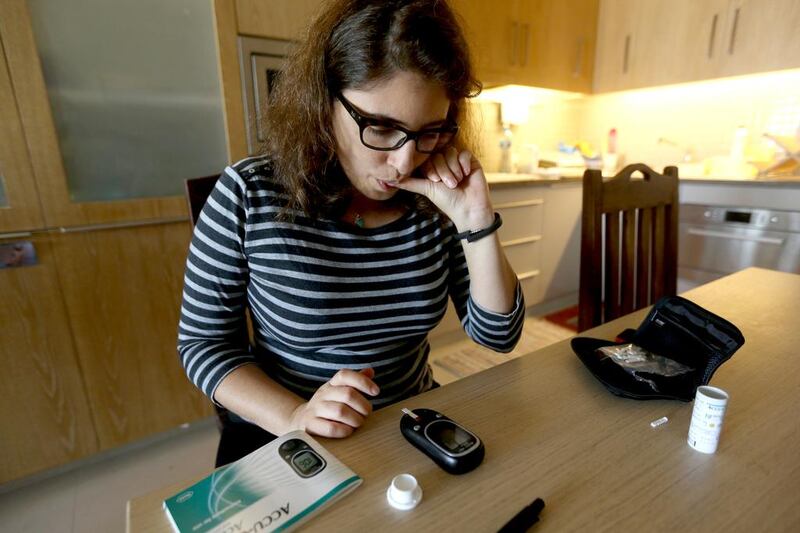The statistics are frightening: nearly 19 per cent of the population in the UAE lives with diabetes. And while there is currently no cure, finding out that you are pre-diabetic, like I did recently, is a step in the right direction – there is still time to alter your lifestyle to avoid the dreaded “D” diagnosis.
Being pre-diabetic means that you may be on the road to developing type 2 diabetes as well as heart disease, but the symptoms are still manageable. Unfortunately, most people don’t notice the warning signs until it is too late and by then, having to turn their lives around becomes a necessity, not a choice.
What is pre-diabetes?
If you are diagnosed with this condition, your blood sugar and insulin are high, but not high enough to put you in the “type 2 diabetes” category.
Dr Saf Naqvi, an endocrinologist and diabetologist at the Imperial College London Diabetes Centre in Abu Dhabi, explains: “Typically after a meal, the pancreas may not be able to produce enough insulin to process the incoming glucose from the blood. Cells could also be insulin resistant and won’t allow the insulin to take glucose from the bloodstream into them.”
Glucose levels can be tested at home with an over-the-counter blood glucose monitoring system, sold in pharmacies all over the UAE.
The normal range falls between 70 to 110 mg/dl; the pre-diabetes range is 100 to 125 mg/dl; the diabetes range is 126 mg/dl and over.
Ideally, get tests done at a lab: your blood will be tested after 10 hours of fasting, then again in an hour after you’ve been given glucose. Lab tests also include checks on your insulin levels before and after glucose intake.
“There is also the haemoglobin A1C test that reflects average blood sugar over three to four months. It can be used to diagnose pre-diabetes or diabetes,” explains Dr Naqvi. The test is offered by most labs, upon the doctor’s request (if your insurance doesn’t cover it, it can be expensive, depending on what your doctor wants tested).
Dr Rita Nawar, an endocrinologist at the Weight Care Clinic in Dubai, stresses the importance of diagnosing and treating pre-diabetes: “Finding out you have this condition is important, because it gives you time to make the required changes to your lifestyle and diet, thus preventing the onset of diabetes.”
Carbs and sugar
Diet is a crucial factor in treating pre-diabetes. Typically, the diagnosis means that you are overweight and a simple reduction in your body fat will greatly improve your health. While popular media have generally struck fear in our hearts when it comes to the F-word, new studies are indicating that carbs are the real culprit. Unlike fat, carbs – cakes, muffins and even whole-grain bread – are broken down rapidly, causing insulin levels to spike.
The other villain is sugar. Last month, the World Health Organization warned that sugar intake worldwide should be halved; the previous recommended intake of sugar was 10 per cent of your daily calorie intake. This means that if your weight is in the normal range, don’t consume more than six teaspoons of sugar a day.
A fat lot of good
Fat, on the other hand, is broken down slowly, does not cause a spike in insulin levels and keeps you satiated for longer. The trick is to include more healthy fats in your diet, such as avocado and olive oil, as opposed to bad fats – such as margarine – that can negatively affect your cholesterol.
The treatment
Doctors usually will treat the condition with medication. The most commonly prescribed medication, and one of the safest, is Glucophage. Compared with other medications, Glucophage lowers insulin levels in an extended release form so most patients don’t feel the common side effects – dizziness, tiredness and nausea. The dosage depends on the glucose levels revealed in blood tests.
Exercise, exercise
Alongside medication, doctors always prescribe exercise. Unfortunately, most of us have sedentary lifestyles here in the UAE – we rarely walk, we use the car even for the smallest of errands, don’t workout regularly and offer the scorching heat as an excuse to limit our outdoor activity. But know that introducing even a little movement to your daily schedule can add years to your life.
You might have pre-diabetes if
You are overweight
You lead a completely sedentary lifestyle
You have high blood pressure
top four pre-diabetes symptoms
Difficulty losing weight
Lethargy
Insatiable hunger
High blood sugar
The Weight Care Clinic is in Dubai; call 04 363 5382. The Imperial College London Diabetes Centre is in Abu Dhabi; call 02 404 0800 or visit www.icldc.ae
[ artslife@thenational.ae ]






